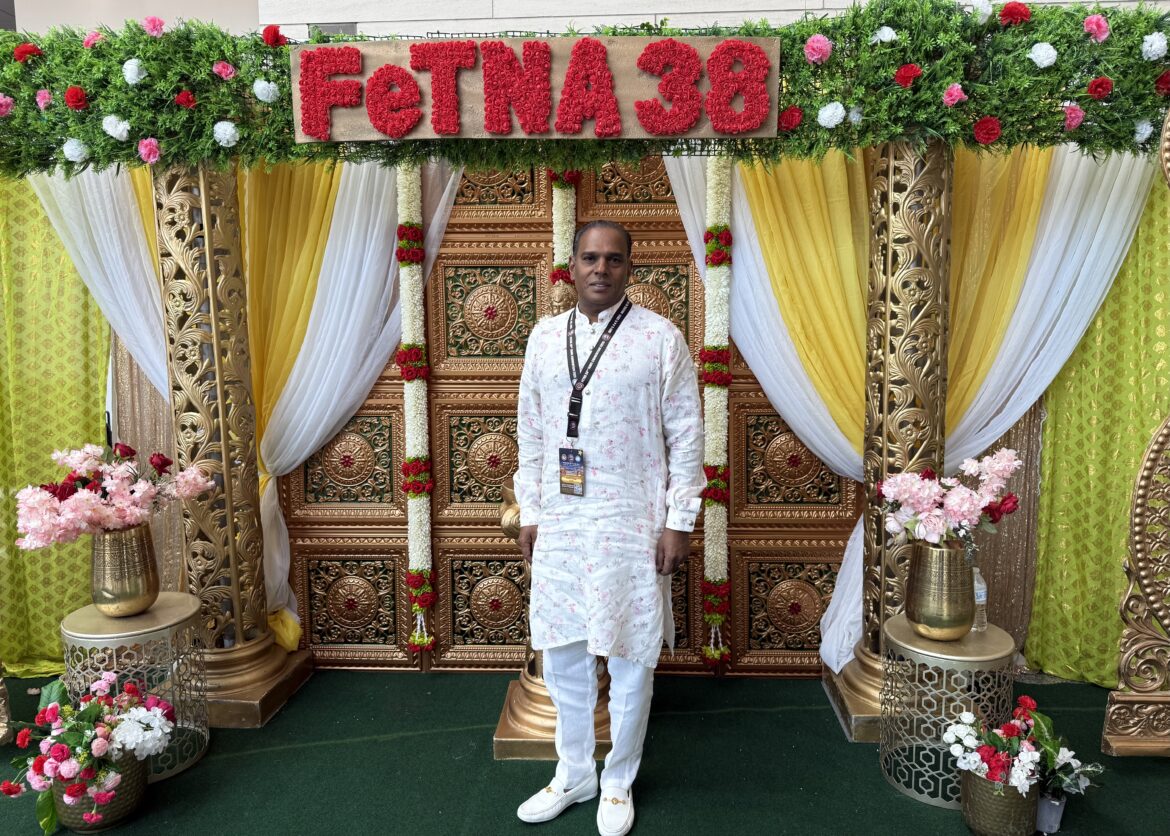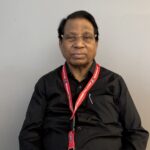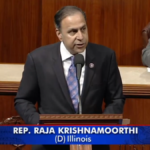Datuk Seri Saravanan Murugan, Deputy President of the Malaysian Indian Congress (MIC) and the longest-serving Malaysian Indian Member of Parliament from Tapah Constituency, participated at the FeTNA 2025 Convention from July 3-5, in Raleigh, North Carolina, for the first time. A prominent voice for the Indian community in Malaysia, Datuk Saravanan has held key leadership roles, including Minister of Human Resources, and is widely respected for his advocacy on education, diaspora empowerment, and Tamil cultural preservation.
In this exclusive interview with South Asian Herald, on July 5, Datuk Saravanan reflects on the significance of FeTNA, the need for global Tamil leadership, his efforts during the COVID-19 pandemic, and the continued fight for Indian rights and representation in Malaysia. He also opens up about his passion for Tamil literature and the importance of education as a tool for long-term community transformation.

Can you tell us about your visit to the FeTNA Convention in Raleigh, North Carolina?
Yes, this is my first time attending the FeTNA Convention, although I’ve been invited several times in the past. I must say, this is a truly unique gathering, bringing together nearly 80 Tamil Sangams from across North America. That kind of unity is rare, even in Tamil Nadu or anywhere else in the world. I’m deeply impressed by how this three-day convention unites people from all walks of life, not just from the U.S. and Canada, but also from India, Sri Lanka, Malaysia, and other countries. It’s a powerful example of global Indian unity.
Today, one of our biggest gaps as a global Indian community is the lack of strong, visible leadership – something we once had in the form of figures like M.G. Ramachandran, M. Karunanidhi, and even Prabhakaran, despite differing views on their ideologies. We need to nurture global Tamil leadership again. We’re seeing many Tamil professionals rising in the corporate world; now is the time to build a leadership network that can champion economic empowerment for Tamils everywhere.
During your time as Minister of Human Resources, you played a key role in helping Malaysian Indians return home during the COVID-19 pandemic. Could you share more about that experience?
I truly believe it was a blessing to have been appointed Human Resources Minister during such a crucial time. Many Malaysians, especially Indians, were stranded abroad, in countries like India, Bangladesh, and elsewhere, with no clear way to return home. While I was responsible for all Malaysians, the Indian community particularly benefited from my role, as they didn’t have as many representatives advocating for them. I prioritized their concerns and mobilized resources quickly. We arranged for around 22 chartered flights from India and two from Dhaka to bring our people home. It was an emotional and fulfilling experience. To this day, I thank God for giving me the opportunity to serve in such a meaningful way.
You’re the longest-serving Member of Parliament from the Tapah constituency. How would you describe your political journey in advocating for Malaysian Indians?
Before I was elected to the Lower House, I served two terms in the Upper House. All in all, I’ve spent around 26 years in Parliament. When you’re part of a minority, you need to speak loudly and clearly to ensure your community’s needs are heard. In Malaysia, I’ve often been that lone voice for Indian issues, especially Tamil community development. I’ve served under seven prime ministers and have seen how consistent effort can yield results. Malaysia, despite its challenges, is a place where hard work pays off. Just look at some of our icons – the Petronas Twin Towers are owned by an Indian, and the major satellite TV network Astro is also led by an Indian. We have about two million Indians in Malaysia, most of them Tamils. While racism exists, just as it does in many other countries, including the U.S., Malaysia still offers opportunities for those willing to put in hard work.

Over the years, how have Indian leaders contributed to the progress of the Indian community in Malaysia?
Our community leaders recognized more than 40 years ago that education was the key to progress. That led to the establishment of Technical and Vocational Education and Training (TVET) colleges focused on the Indian community. We didn’t wait for government support. We created our own funding systems and institutions. As a result, we’ve produced more than 45,000 professionals – doctors, lawyers, and engineers – through our own initiatives. This educational empowerment has given many Malaysian Indians opportunities not only in Malaysia but around the world. We consider education a vital tool for success.
What is your view on India–Malaysia relations today?
India remains one of Malaysia’s most important trade partners. While Malaysia, as a Muslim-majority country, also maintains robust ties with Organization of Islamic Countries (OIC), and Pakistan, our relationship with India is very strong. India and China are both critical to our economy, and Malaysia cannot afford to ignore either. India has always been supportive and remains an essential ally in our development journey.
As Deputy President of the Malaysian Indian Congress, what key initiatives have you spearheaded for the Indian community?
As Deputy President, my role is to be a strong voice for the Indian community. The MIC was part of the ruling coalition for 60 years, and while we currently don’t hold government office, this has allowed us more freedom to speak up for Indian interests. Unlike Indian populations in countries like Sri Lanka or Indonesia, Malaysian Indians have largely stayed in the country and continued to fight for their rights. Our efforts have focused on economic and educational upliftment. There’s more to be done, of course, but we’ve laid a strong foundation.
You’re also admired for your Tamil literary and oratorical skills. How do you find time for these pursuits alongside your political responsibilities?
Tamil literature and oratory are my passions. They help me decompress from the pressures of political life and keep me connected with my roots. Through literary forums and events, I’ve built strong relationships with Tamil-speaking communities across the globe. This engagement brings me both joy and purpose.
(This interview has been edited for length, brevity, and clarity)






